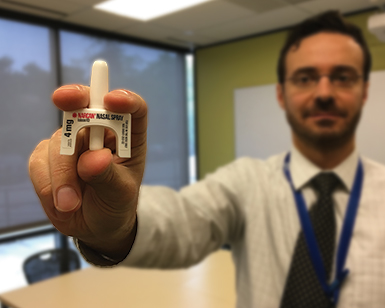San Rafael, CA – More than 2,000 people die from opioid-related deaths in California each year, and Marin County is not immune. It has averaged 215 drug-overdose fatalities over the past seven years, many opioid-related, according to the Marin County Department of Health and Human Services (HHS).
 Dr. Jeff DeVido, holding an intranasal narcan device that can reverse the effects of a drug overdose, is among the Marin County Health and Human Services employees coordinating efforts with local partners to address the opioid crisis.
Dr. Jeff DeVido, holding an intranasal narcan device that can reverse the effects of a drug overdose, is among the Marin County Health and Human Services employees coordinating efforts with local partners to address the opioid crisis.But there is good news: More resources are on the way for local collaborative efforts. Several Marin agencies have received timely support in the form of state grants to achieve two goals: 1) help support expansion of local activities to improve access to life-saving medications and treatment, and 2) to improve education about substance use disorders.
On June 20, the Center at Sierra Health Foundation announced more than $16.4 million awarded to 120 organizations at more than 270 sites/access points throughout California. The funds will go through the Medication Assisted Treatment (MAT) Access Points Project to ensure that the delivery of MAT facilitates positive treatment outcomes, safe management of care transitions and long-term recovery for people with opioid and other substance use disorders.
Four Marin County organizations were granted nearly $500,000 through the MAT Access Points Project. Marin HHS’ Behavioral Health and Recovery Services Division was awarded $184,000 for program development and to help fund a recovery coach position to facilitate care coordination between acute care mental health locations. Marin General Hospital received $100,000 to help fund educational efforts and support addiction program development, and Marin Treatment Center will use its $100,000 grant to assist justice-involved individuals with opioid use disorder and expand treatment options for individuals with Medicare. Finally, Center Point, Inc., received $100,000 to expand access to MAT through their programming by engaging additional medical providers.
“These grants are such a wonderful opportunity for us to expand our treatment options and to help align our goals and efforts with those of our local healthcare partners,” said Marc Hering, Executive Vice President of Centerpoint. “It’s a welcome shift to see addiction treatment become more of a central health care priority.”
In addition to the MAT Access Points Projects grants, Marin HHS has received a similar $135,000 MAT expansion grant to increase the availability of medications for addiction treatment in criminal justice settings. That grant facilitated the collaboration of custody health, adult drug court, Marin County public health and behavioral health, Marin City Health and Wellness, and Bay Area Community Resources.
Marin HHS, the RxSafe Marin coalition, and various local stakeholders such as the Spahr Center and the Marin County Jail also have been the recipients of additional grant awards to reduce opioid abuse in recent years. The grants have led to the distribution of hundreds of narcan opioid overdose reversal kits through community trainings, local treatment providers, libraries, police, and directly to jail inmates.
“All these grants fit into our larger goal of addressing the opioid epidemic locally through collective efforts that expand access to treatment, especially MAT,” said Dr. Jeff DeVido of Marin HHS, who contributed to the grant applications for several of the local grant recipients. “Expanding access to treatment is one of our priority goals of HHS and RxSafe Marin, our local opioid coalition.”
DeVido said the other priority goals are decreasing opioid supply through education about safe prescribing and good medication stewardship as well as expansion of safe disposal options and decreasing the risk of overdose through expansion of the availability of narcan, the opioid overdose reverse medication.
“It’s just really exciting to see the various local organizations work together and coordinate our efforts to meet the local need,” said Rebecca Maxwell, Behavioral Health Director at Marin General Hospital.
Brian Slattery, CEO of Marin Treatment Center, added: “Addiction is a treatable illness, and people with addiction and the treatment itself have too long been marginalized. These grants help to facilitate our efforts to bring individuals with addiction and addiction treatment in from the margins of health care.”
Through an innovative partnership between HHS Emergency Medical Services, Marin County Public Health, and Marin County Behavioral Health, those who have suffered a nonfatal overdose now receive targeted outreach from addiction specialists in the hopes of facilitating better connections between those individuals and treatment providers.
Learn more about the MAT Access Points Project at mataccesspoints.org.